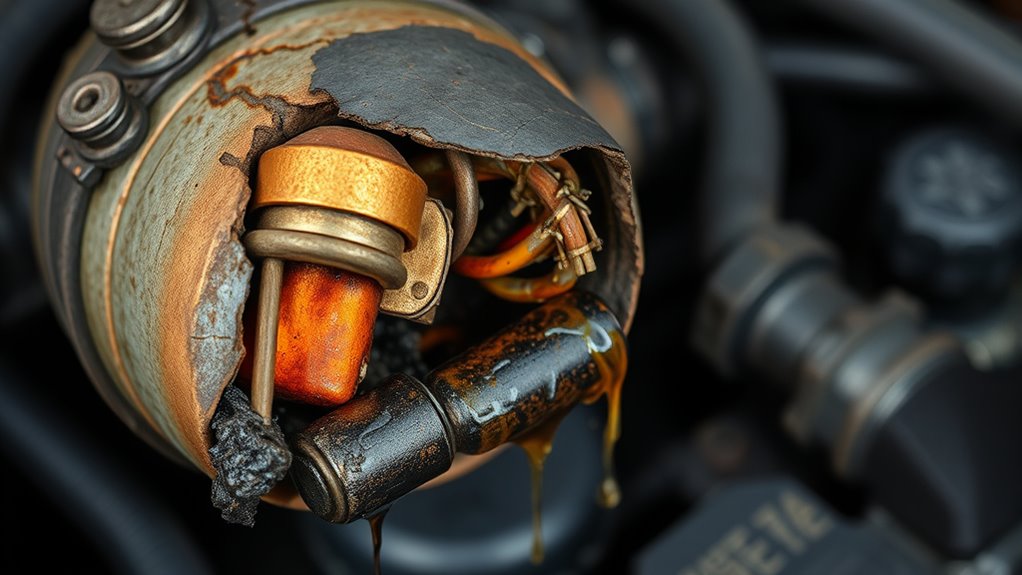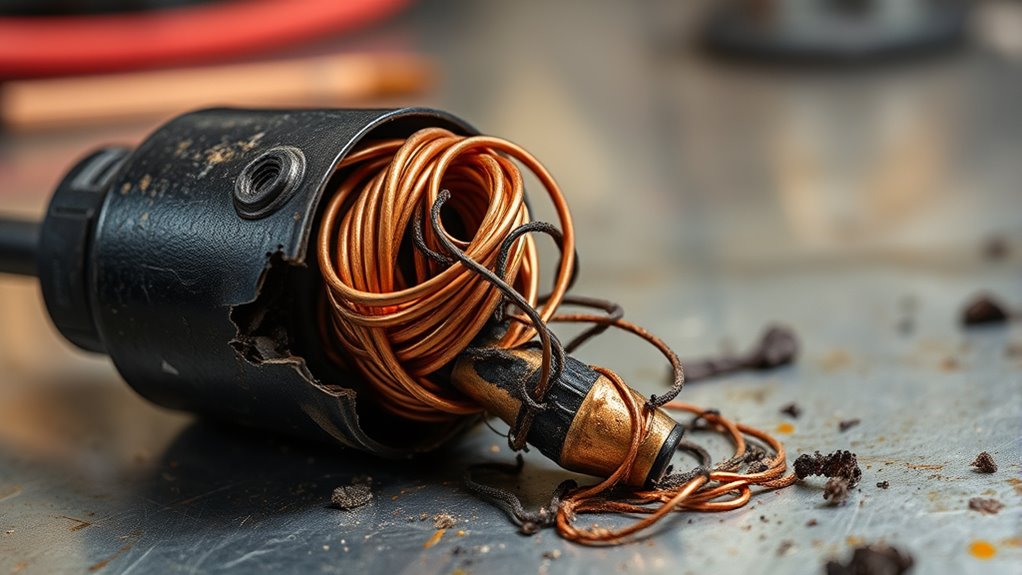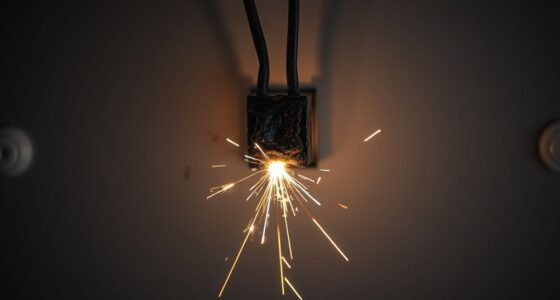Ignition coil failures happen mainly because of worn spark plugs, faulty wiring, or moisture getting into the system. When spark plugs wear out, they demand more energy, putting extra strain on the coil and increasing the risk of failure. Damaged or corroded wiring can disrupt electrical signals, leading to misfires and poor engine performance. Understanding how these issues interconnect can help you keep your ignition system running smoothly and avoid costly repairs.
Key Takeaways
- Ignition coil failures often result from worn spark plugs, wiring issues, moisture, dirt, or component degradation over time.
- Worn spark plugs increase energy demands on the coil, leading to misfires and accelerated coil wear.
- Electrical problems like loose, corroded, or damaged wiring cause intermittent signals and coil malfunction.
- Symptoms include rough idling, engine misfires, hesitation, stalling, and difficulty starting.
- Preventive maintenance such as inspecting wiring, replacing spark plugs, and addressing electrical issues extends coil lifespan.

Ignition coil failures can cause your vehicle to run poorly or stall unexpectedly. When the coil isn’t functioning correctly, it struggles to generate the high-voltage current needed to create a spark at the spark plugs. Without a strong spark, your engine won’t run smoothly, and in some cases, it might even refuse to start. One common cause of ignition coil problems is spark plug wear. Over time, spark plugs can become fouled, corroded, or simply worn out, leading to misfires and increased strain on your ignition system. When spark plugs are past their prime, they demand more energy to produce a spark, which can overload the coil and accelerate its failure. So, if your engine begins running rough or you notice a decrease in fuel efficiency, it’s worth checking both the spark plugs and the coil.
Wiring issues are another frequent culprit behind ignition coil failures. Your vehicle’s wiring harness connects the coil to the ignition switch, ECU, and other components, and if these connections become loose, corroded, or damaged, they can disrupt the flow of electrical current. Faulty wiring can cause intermittent spark production, leading to misfires and poor engine performance. Sometimes, moisture or dirt can infiltrate the wiring connectors, creating a short circuit or resistance that hampers proper ignition. When wiring issues are present, the coil may receive inconsistent signals, which can cause rough idling, stalling, or difficulty starting your vehicle. Regularly inspecting the wiring and connectors for corrosion or damage can help prevent coil failures linked to electrical problems. Additionally, understanding how these factors interplay is essential for diagnosing ignition coil issues accurately.
Spark plug wear puts extra demand on the coil, while wiring issues can prevent the coil from delivering a consistent spark. Both conditions can cause your engine to behave erratically or stall altogether. If you notice symptoms such as engine hesitation, rough idling, or difficulty starting, don’t ignore them. Addressing spark plug wear early by replacing worn plugs and inspecting wiring connections can prolong the life of your ignition coil and improve overall engine performance. Remember, ignition system components work together, and neglecting one part can compromise the entire system. Regular maintenance and timely replacements will keep your vehicle running smoothly and prevent unexpected breakdowns caused by ignition coil failures. Moreover, narcissistic traits can sometimes influence how individuals handle stress or conflicts related to vehicle repairs, highlighting the importance of clear communication and patience during troubleshooting.
Frequently Asked Questions
Can a Faulty Ignition Coil Cause Increased Fuel Consumption?
Yes, a faulty ignition coil can cause increased fuel consumption. When the coil malfunctions, your engine’s fuel efficiency drops because it struggles to ignite the fuel-air mixture properly. This leads to incomplete combustion, wasting fuel and reducing overall engine performance. You might notice your car consumes more fuel than usual, and your engine runs rough. Addressing the ignition coil issue promptly helps restore ideal engine performance and improves fuel efficiency.
How Long Does an Ignition Coil Typically Last?
Think of your ignition coil as the heartbeat of your engine; its lifespan varies but generally lasts between 100,000 to 150,000 miles. You can expect good coil durability if you maintain your vehicle properly. Signs of coil wear may appear sooner, so stay alert. Regular check-ups help extend its life, ensuring your engine runs smoothly and efficiently for years to come.
Are Ignition Coil Failures More Common in Certain Vehicle Models?
Yes, ignition coil failures are more common in certain vehicle models due to manufacturing defects or design issues. Some brands or models may experience higher failure rates because of poor quality control or specific manufacturing processes. You might notice these failures more frequently in older models or those with known recall issues. To reduce risk, keep up with regular maintenance and address any early signs of coil problems promptly.
What Are the Signs of Intermittent Ignition Coil Issues?
If you notice your engine experiencing spark misfire or rough idling, you might be dealing with intermittent ignition coil issues. These problems cause inconsistent sparks, leading to engine hesitation and poor acceleration. You may also see increased fuel consumption or engine stalls. Pay attention to these signs, especially if they come and go, as they indicate your ignition coil isn’t functioning properly. Addressing this early can prevent more serious engine damage.
Can Ignition Coil Problems Affect Emissions Test Results?
When your ignition coil acts up, it can throw a wrench in your emissions test results. Faulty ignition coils lead to incomplete combustion, causing higher emissions. If you ignore the problem, it might be time for ignition coil replacement, which helps your emissions control systems work smoothly. Don’t let small issues snowball—address ignition coil problems promptly to pass emissions tests and keep your vehicle running cleanly.
Conclusion
So, next time your engine sputters or stalls, don’t blame the fuel or the spark plug alone. Sometimes, it’s your trusty ignition coil quietly giving up without warning. Ironically, it’s the tiny coil that plays a big role in your car’s smooth ride. Ignoring it might save a few bucks now, but it could cost you a lot more later. After all, who knew that such a small part could cause such big trouble?









